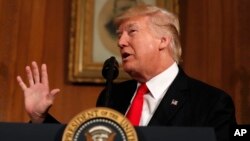Many nations urged U.S. President Donald Trump on Monday to remain in the global agreement to combat climate change, even if he reduces the ambition of U.S. pledges to cut greenhouse gas emissions.
Trump's main advisers are due to meet on Tuesday to review his threat to quit the 2015 Paris Agreement to limit global warming, that is backed by governments as diverse as China, OPEC oil producers and the poorest African states.
At U.N. negotiations that began on Monday in the German city of Bonn, the chairman of the talks, Moroccan Foreign Minister Salaheddine Mezouar, said global momentum to combat climate change was irreversible and it would be "difficult or foolish" for anyone to defy public pressure for action.
At the talks, which run until May 18, almost 200 nations will try to work out detailed rules for the agreement. Delegates called on countries to implement their pledges to cut emissions.
When asked about the U.S. position, Yvon Slingenberg, head of the European Commission's delegation, told a news conference: "We do consider that it would be quite important [for the U.S.] to stay at the table," even with Trump's pro-coal policies.
Trump's advisers have warned of legal problems if Washington stays in the Paris deal but waters down former president Barack Obama's goal of deep cuts in emissions by 2025.
The Paris Agreement's Article 4 says any nation can adjust its goals at any time "with a view to enhancing its ambition."
It does not mention an option of reducing ambition and some U.S. legal experts argue that the wording makes it impossible for Trump to stay in the agreement and carry out his promises to promote the high-emitting U.S. coal industry.
But many delegates say the accord is vague enough to let nations scale back ambitions if needed, perhaps because of future economic recessions or natural disasters.
Patricia Espinosa, the U.N.'s climate chief, told an online news conference that the spirit of the Paris Agreement was for all nations to set ever more ambitious targets.
"Having said that, it is important to acknowledge that parties may at different moments face some specific situations that they may wish to address," she added.
The U.S. delegation in Bonn is unusually small with just seven officials - fewer, for instance, than the number sent by nations such as Algeria or Zimbabwe.
In Washington, some powerful U.S. conservatives reaffirmed opposition to the Paris deal.
"Remaining in the Paris Climate Treaty would undermine the Trump administration's efforts to protect American families from unnecessary and burdensome climate regulations," said Thomas Pyle, president of the American Energy Alliance, who served on Trump's transition team.





